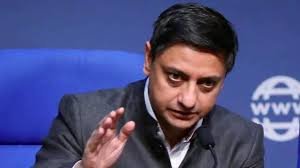Former civil servants, who have held top positions in the government service, are not happy with economist Sanjeev Sanyal, member of the Prime Minister’s Economic Advisory Council (EAC-PM).
His statements were variously described as “ignorant” and “ill-informed”, one of them quoting Thomas Gray’s poem “Ode on a Distant Prospect of Eton College” (1742): “Where ignorance is bliss, it’s foolish to be like that.”
In a series of posts on social media platform X, Sanyal said that five to eight years of preparation for the civil services examination by lakhs of students is a “waste of youth energy”.
“As mentioned, it is absolutely fine to attempt UPSC or other such exams, but only if the person wants to become an administrator. The problem is that millions of people are spending 5-8 years doing this test again and again as a ‘way of life’. This is a waste of youth energy,” he said in a series of social media posts.
Former Union Finance Secretary Arvind Mayaram said that although Sanyal’s views were welcome, they were wrong and smacked of gross ignorance. “I believe there is no service in the world that provides such a broad canvas of experience of public policy and governance that shapes the lives of ordinary people,” he told this correspondent.
Mayaram says: “If Sanyal wants to understand why certain policies work or don’t work, why sometimes you have to make the decisions that have to be made, even if they are not the best in the circumstances, So he can go to Harvard or wherever he likes to go. But I can tell you that this is a narrow part of their experience.
With tongue firmly in cheek, the former Finance Secretary said that sometimes ‘ignorance is bliss.’
MG Devashayam, another former IAS officer, said Sanyal had little knowledge about civil services. “He sees civil services as a five-star way of survival. He does not know that young civil servants work in remote areas, where they get ground level experience. Sanyal is looking at IAS through a corporate lens and this is a mistake.
According to Devasahayam, editor of the book “Electoral Democracy: An Inquiry into the Fairness and Integrity of Elections in India”, Sanyal needs to read the Constitutional Assembly debates and the thoughts of Sardar Vallabhbhai Patel, who underlined the role of the civil service Was. In a newly independent country.
“The bureaucracy had the difficult responsibility of lifting the country out of abject poverty, maintaining law and order in a situation of serious communal disturbance and maintaining the integrity of the nation. Despite some hiccups, he has done a very good job there,” he said.
Devashayam, however, agrees with Sanyal that some of the time-tested pillars that hold the civil service together have eroded over the years. “The politicians who have now come into public life are corrupt, evil, discriminatory and communal and they have managed to inject these viruses into the civil service as well. Talented and honest officers are driven out and time servers are inducted. Goes because they do the bidding of politicians,” he concluded.
In an interview to a news outlet, Sanyal also said that he feels it is a ‘waste of time’ for people who qualify for ‘other’ civil services like IPS and IRS to take IAS again and again.
The economist and sometimes historian spoke on the ‘poverty of aspiration’ that India has suffered for decades and cited the examples of West Bengal and Bihar to illustrate his point. “Just as Bengal aspires for pseudo-intellectuals and Sangh leaders, Bihar aspires for small-time local goon politicians. In an environment where they are role models, you can either become a local goon, if you don’t want to be a local goon, your path is basically to become a civil servant,” he told reporters.
Wajahat Habibullah, former chairman of the National Commission for Minorities and a civil servant who was divisional commissioner of eight districts in Jammu and Kashmir, said that even though the civil services are out of tune, being fundamentally a colonial service, the fact is that Civil Services Examination and UPSC act as role models for many youngsters. “Despite having outlived its usefulness, there is no doubt that civil services provide ample opportunities to the youth to serve at the grassroots level. They offer options like no other job in the world and it depends on That’s how people use these situations,” he said.

